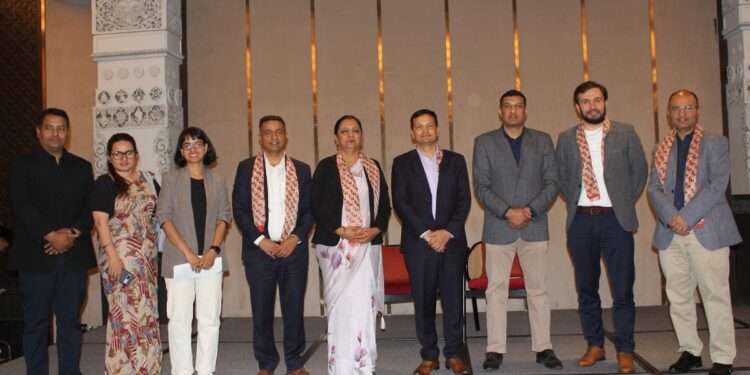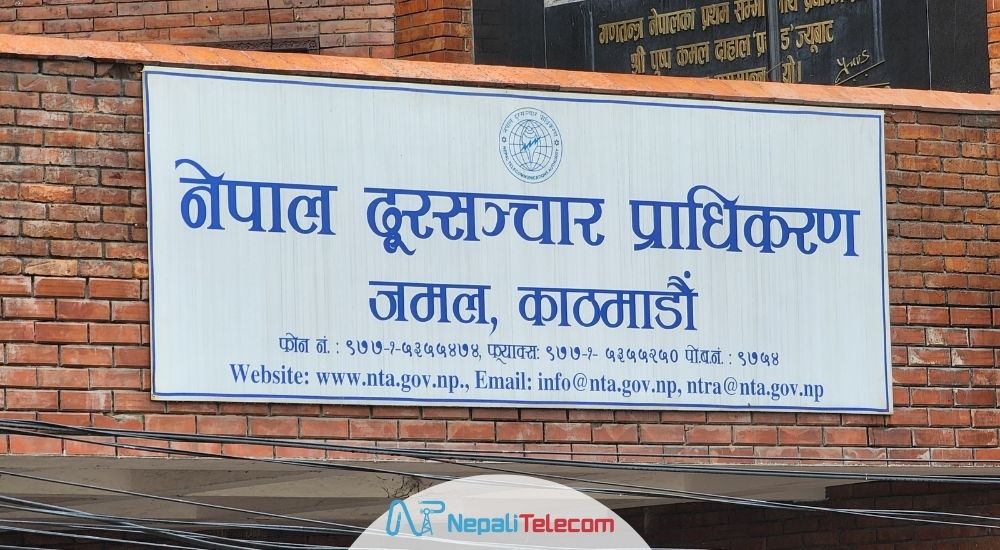Stakeholders have called for a serious address as the telecom industry faces deepening challenges. In a program hosted on Tuesday, April 09, 2024, Tech Journos Forum (TJF) jointly raised concerns over the state of the country’s telecommunication industry and declared that it was time everyone put an effort to remedy them. The concerns were highlighted by speakers in an interactive program titled “Exploring Opportunities and Challenges in Nepal’s Telecommunications Sector.”
The program had prominent figures for speakers. This included Ntc MD Sangita Pahadi, Ncell CEO Jabbor Kayumov, NTA chairman Bhupendra Bhandari, etc.
Stakeholders raise concern over telecom industry challenges
Economist and Dr. Prof. Achyut Wagle at Kathmandu University gave his presentation on the challenges of the telecom industry in Nepal. Emphasizing the 100-year history of the industry, he lamented the lack of study on its possibilities.
He argued that there are no qualified people related to the development of this sector in the government bodies. He complained, “The expertise is not found in how emerging technologies evolve, but it’s perceived that expertise comes after sitting in a chair.” Dr. Wagle satirized the complacency of the people in positions for apparently their lack of solid efforts to propel the telecom industry of the country.
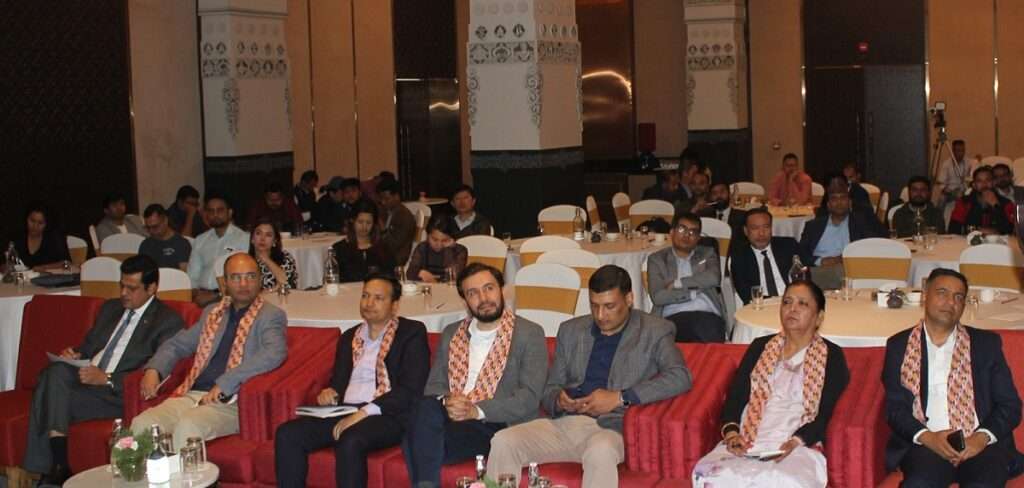
He further added that Nepal has to import every telco equipment for the industry. “Goods that can be produced locally are not yet identified,” he lamented. To stress his argument, Dr. Wagle brought a stat that the industry spends about $650 million annually on telco gear imports.
Drawing on more figures, Dr. Wagle stated that the telco industry contributes to 6.6% of the country’s total GDP in India. Likewise, the very industry contributes 5.4% to China’s GDP. In Nepal, it stands at a paltry 1.4%. The government builds the infrastructure and the private sector provides service. “In Nepal, the government itself competes in the industry. This way, the country and the private sector don’t develop globally,” Dr. Wagle emphasized.
RTDF project delays are affecting the telecom industry- NTA Chair Bhandari
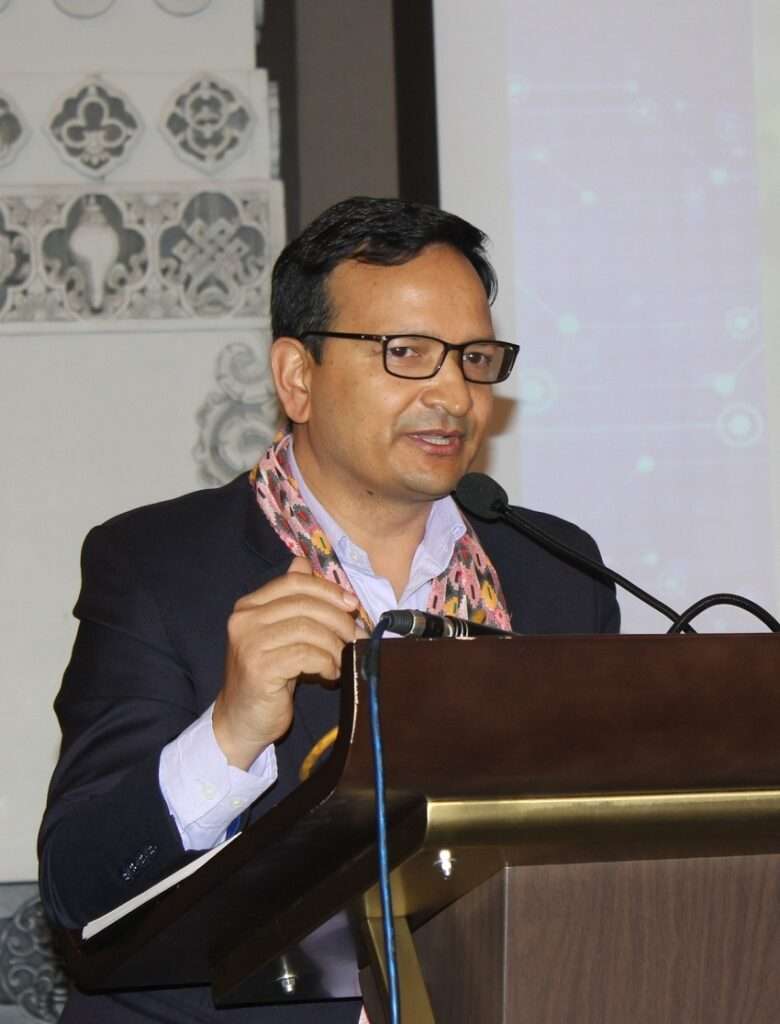
In the meantime, Nepal Telecommunications Authority (NTA) Chairman Bhupendra Bhandari pointed to the delays in Rural Telecommunication Development Funds (RTDF) projects and their impact. Acknowledging that there is a digital divide in Nepal, the newly-appointed chair said that the RTDF-funded projects could have served as a backbone but their progress has slowed down. “The projects of the Rural Telecommunication Development Fund have also slowed down. If these projects were completed, they could have become a backbone,” he said. Bhandari emphasized the joint efforts for telecom companies and internet service providers (ISP) to evolve together.
Also read: NTA completes RTDF Mid-Hill optical fiber project in Koshi Province, ready for sharing
Only 12.5% of available frequencies are in use in Nepal
Quite strikingly, Nta chair Bhandari said that only 12.5% of the available frequencies are used in Nepal. However, he did state that the use of more radio waves must increase. More importantly, he mentioned the need for amendments in the Telecommunication Act and bylaws highlighting that the expectations from the industry are now different from those 27 years before. Check out: Frequency bands used in Nepal for Cellular network
ONly 12.5% of the available freqeuncy is in use in Nepal
Ntc chairman Bhupendra Bhandari
Ncell Chief Executive Officer (CEO) and Managing Director (MD) Jabbor Kayumov spoke of the need for the state’s help. He said that the telecommunications industry needs government support. “We should work together for the upliftment of this region because this region is facing a lot of problems now and I believe that the Nepal government will help to solve this problem.”
Adding further, Kayumov said, “The question is, how do we go forward from here?” The problem of this sector is not only in Nepal, but in some countries around the world, but they have effectively intervened and regulated various problems in time to solve the problem of this sector. We want the government of Nepal to solve the problem in this area in the right way.”
Check out: CG Loses License for Rural Telecom Service, Revoked Automatically
Time to invest in smart cities and AI
Kayumov also highlighted Nepal’s need to embrace newer tech and innovations. The world has moved forward for smart cities, smart cars, and Artificial Intelligence (AI). According to the Ncell CEO, Nepal should also focus on these new technologies. But he stressed the government’s support to enable it to ensure Nepal doesn’t lag behind.
Foreign companies need clear rules and policies
Kayumov said that companies like Ncell with foreign investment need transparent, stable, and timely policies for consumers to get accessible and accessible facilities. “The success of the digitization process is highly dependent on the quality of the telecommunication system. The future is digital, and Nepal has great potential in this field. We are committed to supporting the digital development of Nepal,” he said.
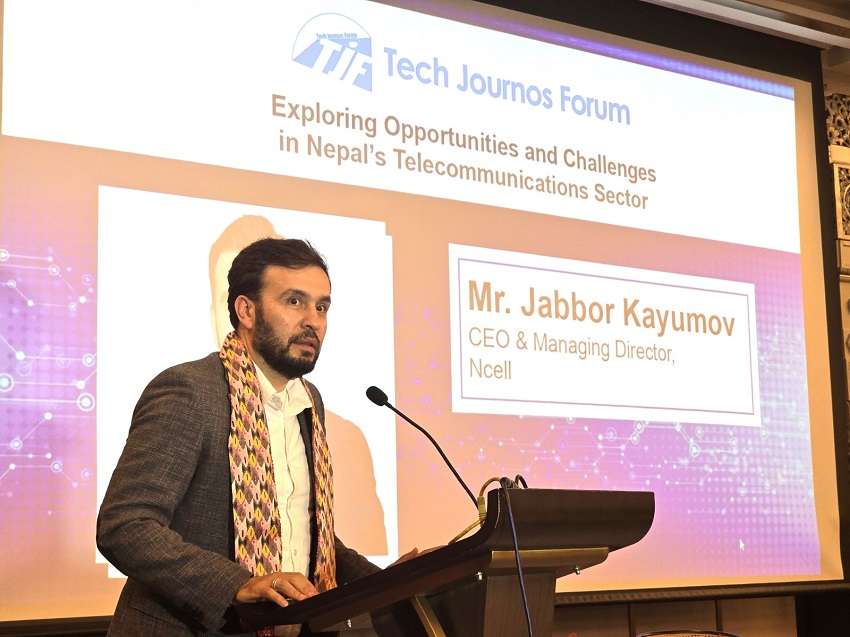
Ncell’s former company Axiata Group exited Nepal selling its 80% of equity shares to Spectrlite UK citing challenging business operations. As per the prevailing rules, the private telco’s license will be invalid in 2029 AD. The company’s fate has long been a topic of question around this scenario.
Ntc MD Pahadi weighs in on policy changes
Also, Nepal Telecom Managing Director (NTC MD) Sangita Pahadi called for changes in the telecom industry and related regulations. Like other participants, she also said that there are challenges in Nepal’s telecom industry and a need to create and implement a business plan including the business policies.
Similarly, Senior Engineer at Ntc, Madhusudhan Dahal offered some vital insights into the company’s 5G trial progress. He then said that due to the increasing liabilities, the revenue growth is shrinking and called on the government to look at it. Dahal highlighted that despite user growth on voice, traffic, and call duration are decreasing. Adding to that, the decreased tariff is bringing in lower revenues for the company. “Despite heavy attraction in mobile data, it’s not generating remarkable revenue,” he added.
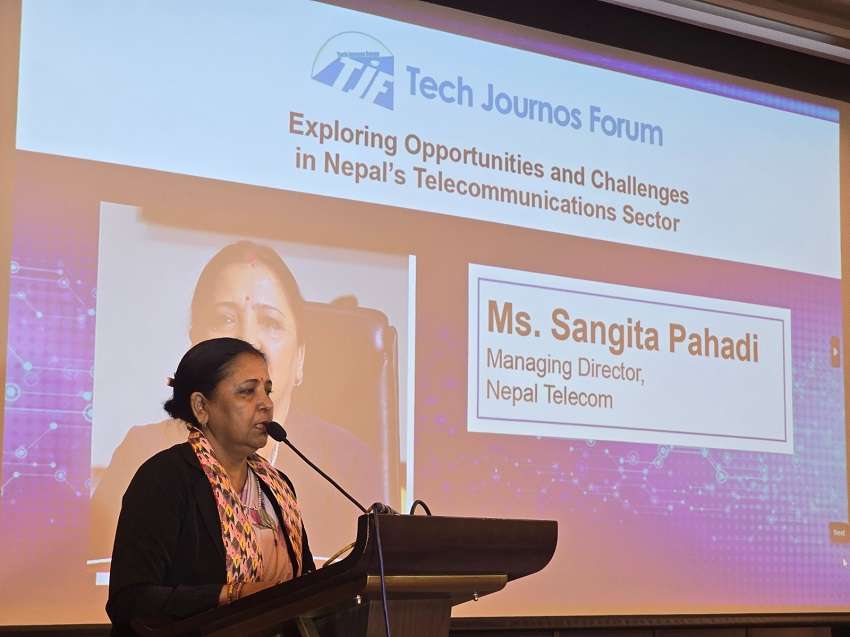
Dahal said that ISP and OTT could be contributing to less financial gains for telecom companies. He said, “Foreign companies are drawing revenues using Nepali frequencies but we are having to pay fees. The government shall have a look at it. To increase data revenue, platforms like OTT services must be regulated and reinforce literacy.”
There’s potential for investment in telecommunications in Nepal
Speaking at the same event, Sushil Bhatta, Chief Executive Officer of the Investment Board, said that since there is potential for investment in the fields of telecommunication, science and technology, and startups in Nepal, high-priority investments will be invited to the investment conference to be organized by the government. He also asked for advice and suggestions along with the commitment to move forward with those involved in this field and experts.
Ncell‘s legal and regulatory officer Vishal Upadhyaya, who also gave a presentation at the program, said that the data consumption per capita in telecom companies in many countries including India is 15 to 20 GB, but in Nepal, the data consumption is only 4 GB per capita. He said that policies, rules, and laws should be improved for the development of the telecommunication sector, but there is still a problem with the 27-year-old law.
Check out: Global 5G data traffic to reach 2.6 billion TB by 2028: Omdia
He said that the government’s frequency policy can be more generous but it’s not paying any heed. Ncell is ready for 5G trial and expansion, but companies will need serious thought to invest Rs 60 billion for Rs 2 billion profit a year. Like others, he also said that the renewal, frequency, and other charges are too high which could become a catalyst to its possible turmoil. Therefore, he urged the government to start thinking about making changes.
TJF chairman Paudel praises group discussion on telecom challenges

Umesh Paudel, the chairman of TJF said that the interaction program was organized in order to identify the opportunities and challenges in this area and also help in solving them. “While we are reporting on the technology sector, we are identifying the problems. It has become necessary to have a group discussion and debate about those problems,” he said.
Journalists working in the field of technology and people involved in the information technology sector of Nepal were present in the program.


